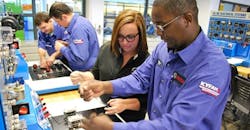For the first time since 2013, the shortage of skilled workers overtakes the economy as the greatest hurdle manufacturers anticipate facing in the year ahead, according to the ASQ 2018 Manufacturing Outlook Survey.
When asked what the top challenge for 2018 will be 41% of manufacturers say finding skilled workers. This tops the 30% who say the economy will be their biggest hurdle.
By comparison, last year’s ASQ Manufacturing Outlook Survey reported that 36 % of manufacturers said the economy would be the greatest challenge, compared to 30% who claimed finding skilled workers would be the biggest hurdle.
“The results of this year’s Manufacturing Outlook Survey are both encouraging and cause for concern,” says ASQ chair Eric Hayler. “While it’s great that the economy is improving, it’s troubling that manufacturers expect to struggle finding the skilled workers they need to be successful.”
More than 650 manufacturing professionals responded to ASQ’s 2018 Manufacturing Outlook Survey, which was conducted online in October and November. Respondents represent a multitude of industries, including automotive, medical device, aerospace, and oil and gas.
To help find the skilled candidates they currently need, 39% of respondents say they have hired an agency to help, while 30% are working with local colleges on programs that teach students the skills needed in manufacturing. Fifteen percent of respondents say they enhanced their benefits package to attract qualified candidates.
And while manufacturers are taking necessary steps to hire for vacant positions, fewer manufacturers anticipate having to fill vacant positions due to retirements — 35% said it’s very unlikely retirements will affect their organization in 2018, compared to 33% who say it will.
Regardless, 43% plan to fill the vacancies on a case-by-case basis, with 69% training new hires on the job. Twelve percent require additional, company-provided classroom training and 6% require third-party classroom training.
In addition to questions about skills shortages and the impact of retiring employees, the Manufacturing Outlook Survey questioned respondents about the economic outlook for the year ahead. In this year’s and last year’s survey, 72% of respondents said they expect an increase in their company’s revenue. However only 69% of respondents this year said they realized an increase in revenue in 2017.
Furthermore, 65% of respondents said they expect salary increases in 2017, up from 61% in the 2016 survey — while less than 1% expect a salary reduction — and 44% said they expect their company to increase staff, compared to 47% last year.
Forty-three percent of respondents expect their organization will maintain current staffing levels, while 13% said they expect staffing cuts in 2018.
